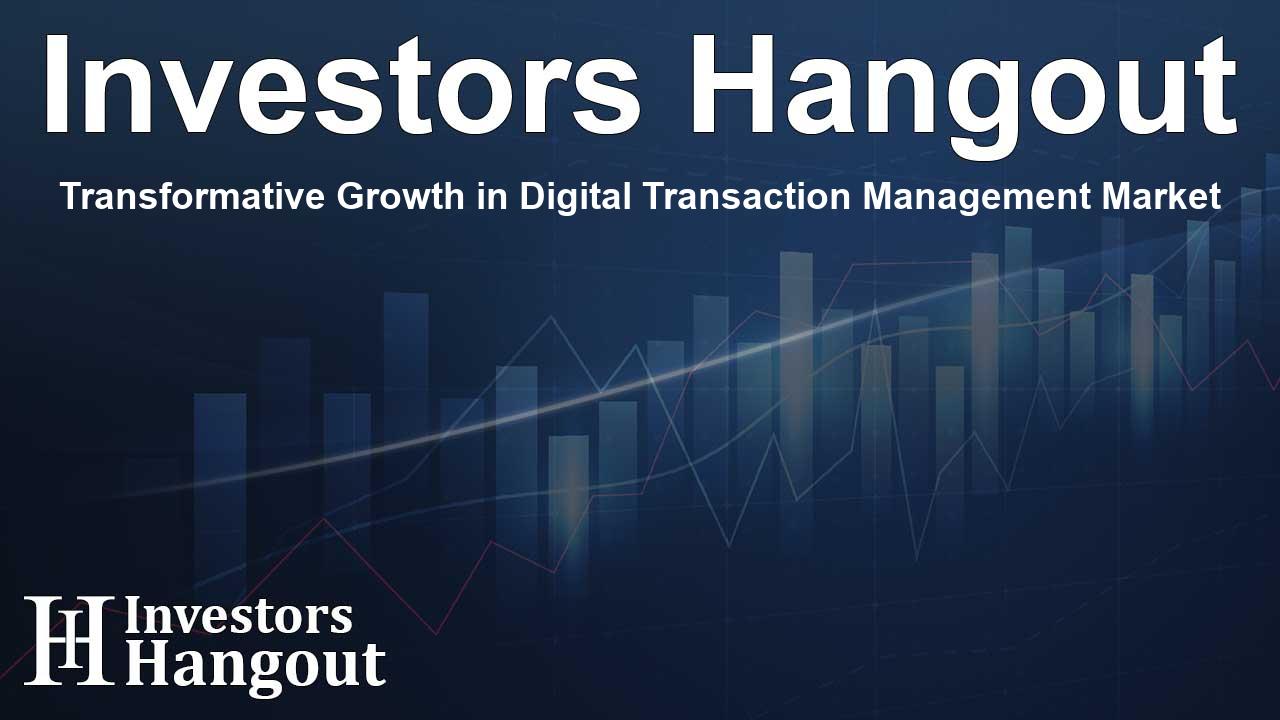Transformative Growth in Digital Transaction Management Market

Understanding the Digital Transaction Management Market
The digital transaction management market is experiencing a significant transformation in recent years. This market was evaluated at approximately USD 12.41 billion in 2023 and is set to expand dramatically, reaching up to USD 86.39 billion by the end of the forecast period, reflecting a robust compound annual growth rate (CAGR) of around 24.1%.
What is Digital Transaction Management (DTM)?
Digital transaction management (DTM) represents a modernized approach to managing digital transactions and facilitating smooth documentation processes in various business sectors. As a cloud-based technology, DTM simplifies the process of electronically signing contracts and agreements, enhancing speed, accuracy, and security. This method positions itself as an advanced alternative to traditional paper-based processes that often face reliability and security issues.
Benefits of Digital Transaction Management
One of the primary advantages of adopting DTM solutions is the substantial time and cost savings businesses can achieve. By digitizing document management, companies can eliminate the lengthy procedures associated with physical signatures and mailing documents. Additionally, DTM supports numerous sectors, including sales, human resources, finance, and IT, where effective documentation practices are crucial to operational success.
Current Trends in the Digital Transaction Management Market
The digital transaction management market is being fueled by a growing inclination towards digital solutions among businesses, primarily driven by the rise of e-commerce and increased reliance on online payment platforms. The demand for automation is another critical factor pushing this growth as organizations recognize the necessity for digital solutions that streamline operations.
Segmentation of the Market
This market segmentation divides companies based on several key criteria, including solutions offered, industry verticals, components, end-users, and geographical regions. Currently, North America spearheads the DTM market, largely attributable to its early adoption of innovative technologies like cloud computing and machine learning.
Factors Propelling Market Growth
Increased Acceptance of DTM Services: Many organizations are increasingly turning to DTM solutions to facilitate quicker and safer transactions. The adoption of DTM technologies is critical as companies strive to expedite signing processes for various agreements.
Growth of E-commerce: With skyrocketing online shopping, there is mounting pressure on organizations to embrace secure and efficient digital payment methods, enhancing the overall market for digital transaction management.
Need for Centralized Documentation: As organizations accumulate more sensitive data, there's a pronounced push for centralized documentation systems that provide better control over workflows and documentation integrity. DTM technologies offer precisely these capabilities, thereby contributing to overall market growth.
Challenges Facing the Digital Transaction Management Market
Despite its potential, the DTM market faces several hurdles. Notably, concerns regarding data privacy and security present formidable challenges. As transactions and sensitive data increasingly migrate to online platforms, the threat of data breaches and cyberattacks rises. Consequently, organizations must navigate a complex regulatory landscape around data protection.
Key Players in the Market
- Adobe
- Ascertia
- DocuFirst
- DocuSign, Inc.
- eDOC Innovations
- Entrust Corp.
- Fluix
- Kofax Inc.
- Nintex UK Ltd
- Wolters Kluwer N.V.
Regional Insights
North America continues to lead in the digital transaction management market, primarily due to its robust adoption of advanced technologies. The integration of DTM with technologies such as AI and cloud services enhances efficiency and customer experience, making DTM solutions vital in contemporary business environments.
As the trend continues to evolve, it is imperative for businesses to stay ahead of the technology curve and embrace digital transaction management to maximize operational effectiveness and customer satisfaction.
Frequently Asked Questions
1. What is digital transaction management (DTM)?
DTM refers to cloud-based technologies enabling businesses to manage their digital transactions, including signing and securing documents electronically.
2. How is the DTM market expected to grow?
The market is projected to reach USD 86.39 billion by 2032, growing at a CAGR of 24.1% from its 2023 valuation of USD 12.41 billion.
3. What industries benefit the most from DTM?
Industries such as finance, human resources, sales, and IT significantly benefit from the efficiency and security that DTM solutions provide.
4. What are some challenges in implementing DTM?
Challenges primarily include data privacy concerns and security risks associated with electronic transaction processes that necessitate stringent compliance with regulations.
5. Who are the major players in the digital transaction management market?
Leading companies include Adobe, DocuSign, and Entrust Corp., among others that are crucial in driving market innovations.
About Investors Hangout
Investors Hangout is a leading online stock forum for financial discussion and learning, offering a wide range of free tools and resources. It draws in traders of all levels, who exchange market knowledge, investigate trading tactics, and keep an eye on industry developments in real time. Featuring financial articles, stock message boards, quotes, charts, company profiles, and live news updates. Through cooperative learning and a wealth of informational resources, it helps users from novices creating their first portfolios to experts honing their techniques. Join Investors Hangout today: https://investorshangout.com/
Disclaimer: The content of this article is solely for general informational purposes only; it does not represent legal, financial, or investment advice. Investors Hangout does not offer financial advice; the author is not a licensed financial advisor. Consult a qualified advisor before making any financial or investment decisions based on this article. The author's interpretation of publicly available data shapes the opinions presented here; as a result, they should not be taken as advice to purchase, sell, or hold any securities mentioned or any other investments. The author does not guarantee the accuracy, completeness, or timeliness of any material, providing it "as is." Information and market conditions may change; past performance is not indicative of future outcomes. If any of the material offered here is inaccurate, please contact us for corrections.